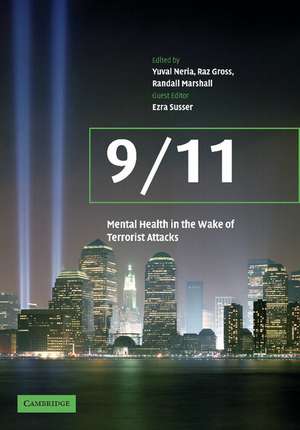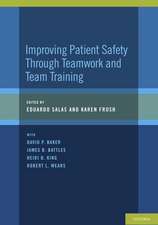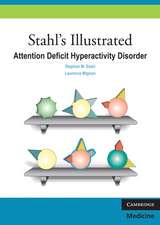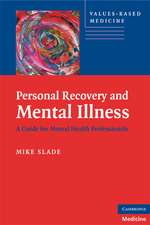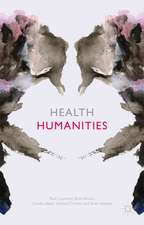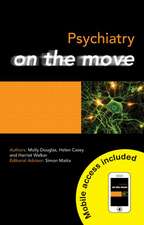9/11: Mental Health in the Wake of Terrorist Attacks
Editat de Yuval Neria MD, Raz Gross MD, Randall D. Marshall, Ezra S. Susser Cuvânt înainte de Beverley Raphaelen Limba Engleză Paperback – 15 aug 2012
| Toate formatele și edițiile | Preț | Express |
|---|---|---|
| Paperback (1) | 673.23 lei 6-8 săpt. | |
| Cambridge University Press – 15 aug 2012 | 673.23 lei 6-8 săpt. | |
| Hardback (1) | 1136.91 lei 6-8 săpt. | |
| Cambridge University Press – 13 sep 2006 | 1136.91 lei 6-8 săpt. |
Preț: 673.23 lei
Preț vechi: 708.67 lei
-5% Nou
Puncte Express: 1010
Preț estimativ în valută:
128.82€ • 134.98$ • 106.49£
128.82€ • 134.98$ • 106.49£
Carte tipărită la comandă
Livrare economică 11-25 aprilie
Preluare comenzi: 021 569.72.76
Specificații
ISBN-13: 9781107406421
ISBN-10: 1107406420
Pagini: 676
Dimensiuni: 170 x 244 x 35 mm
Greutate: 1.06 kg
Editura: Cambridge University Press
Colecția Cambridge University Press
Locul publicării:New York, United States
ISBN-10: 1107406420
Pagini: 676
Dimensiuni: 170 x 244 x 35 mm
Greutate: 1.06 kg
Editura: Cambridge University Press
Colecția Cambridge University Press
Locul publicării:New York, United States
Cuprins
Foreword; Part I. Introduction: 1. Mental health in the aftermath of terrorist attacks: making sense of mass casualty trauma; Part II. The Psychological Aftermath of 9/11: 2. Preface; 3. Posttraumatic stress symptoms in the general population after disaster: implications for public health; 4. Coping with a national trauma: A nationwide longitudinal study of responses to the terrorist attacks of September 11th; 5. An epidemiological response to disasters: the New York City Board of Education's Post 9/11 Needs Assessment; 6. Historical perspective and future directions in research on psychiatric consequences of terrorism and other disasters; 7. Capturing the impact of large-scale events through epidemiological research: challenges and obstacles; 8. Mental health research in the aftermath of disasters: using the right methods to ask the right questions; Part III. Reducing the Burden: Community Response and Community Recovery: 9. Community and ecological approaches to understanding and alleviating postdisaster distress (Introduction to section); 10. What is collective recovery?; 11. Rebuilding communities post disaster in New York; 12. Journalism and the public during catastrophes; 13. Effective leadership in extreme crisis; 14. Guiding community intervention following terrorist attack; Part IV. Outreach and Intervention in the Wake of Terrorist Attacks: 15. Science for the community after 9/11; Part IV.i. New York Area: 16. The psychological aftermath of 9/11 attacks in primary care; 17. Project Liberty: responding to mental health needs after the World Trade Center terrorist attacks; 18. The Mental Health Association of New York City; 19. The New York Consortium for Effective Trauma Treatment; 20. First responders: FDNY and Con Edison; 21. The World Trade Center Worker/Volunteer Mental Health Screening Program; 22. Child and adolescent trauma treatments and services after September 11: implementing evidence-based practices into complex child-serving systems; 23. Relationally and developmentally focused interventions with young children and their caregivers in the wake of terrorism and other violent experiences; Part IV.ii. Washington DC: 24. The mental health response to the 9/11 attacks on the Pentagon; 25. Learning lessons from the early intervention response at the Pentagon (commentary); Part IV.iii. Prolonged-Exposure Treatment as a Core Resource for Clinicians in the Community: Dissemination of Trauma Knowledge Post Disaster: 26. Psychological treatments for PTSD: an Overview; 27. Dissemination of prolonged exposure therapy for PTSD: successes and challenges; 28. Training therapists to practice evidence-based psychotherapy after 9/11; Part V. Disasters and Mental Health: Perspectives on Response and Preparedness: 29. The Epidemiology of 9-11: technological advances and conceptual conundrums; 30. Searching for points of convergence: a commentary on prior research on disasters and some community programs initiated in response to September 11, 2001; 31. What mental health professionals should and shouldn't do; 32. Coping with the threat of terrorism; 33. Preparedness and future directions; 34. Lessons learned from 9/11: the boundaries of a mental health approach to mass casualty events; 35. Post-disaster research: lessons learned from 9/11 and future directions.
Recenzii
Review of the hardback: 'This is a great and exciting book; a volume filled with stories of endeavour, achievement, appraisal and learning; stories of heroism, challenge and hope. It will become a handbook for all who would research the impact of disaster and terrorism on mental health and well-being.' Beverley Raphael, from the Foreword
Review of the hardback: 'Refreshingly, the books contributors freely and vigorously critique each other's chapters … it offers an important contribution to the disaster mental health literature.' British Medical Journal
Review of the hardback: 'This book will continue to appeal to people working in the PTSD industry. There is a lot of material here that is relevant to the ongoing situation in a wide variety of countries.' Martin Guha, King's College London
Review of the hardback: 'Refreshingly, the books contributors freely and vigorously critique each other's chapters … it offers an important contribution to the disaster mental health literature.' British Medical Journal
Review of the hardback: 'This book will continue to appeal to people working in the PTSD industry. There is a lot of material here that is relevant to the ongoing situation in a wide variety of countries.' Martin Guha, King's College London
Descriere
A handbook for all who would research the impact of disaster and terrorism on mental health and well-being.
